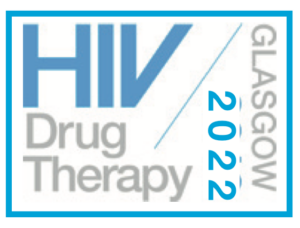Glasgow 2022: Fostemsavir: QT prolongation and drug-drug interactions
1 December 2022. Related: Conference reports, Antiretrovirals.
 HIV Glasgow included a poster on the risk of QT prolongation with fostemsavir (FTR) as this has previously been reported with both FTV and its active metabolite temsavir (TMR) when administered at supratherapeutic doses. [1]
HIV Glasgow included a poster on the risk of QT prolongation with fostemsavir (FTR) as this has previously been reported with both FTV and its active metabolite temsavir (TMR) when administered at supratherapeutic doses. [1]
QT prolongation was reported for 7 (2%) of participants in the phase 3 registrational BRIGHTE study who discontinued due to QT prolongation by week 96. Analysis of drug-drug interactions indicate that consideration should be given when FTR is co-administered with other drugs that influence QT interval (e.g. EFV, LPV and antiarrhythmics).
Therapeutic doses of FTR have not been linked to QT prolongation and the Liverpool database does not indicate potential interactions with other commonly used ART (i.e. INSTI, NRTI, or DOR). [2]
FTR is approved for twice daily dosing (600 mg BD) for people with multidrug-resistant HIV, in combination with other active ARVs. Pre-clinical studies of FTR noted QT prolongation (8 to 18ms) at supratherapeutic doses. Above therapeutic dosing, FTR has a dose-dependent impact on QT interval.
FTR is metabolised to TMR by cytochrome p450 and co-administration with other drugs may alter the PK profile, leading to higher plasma concentrations. QT prolongation threshold (>10ms) is met when plasma TMR levels are >7,500ng/mL (>4x reported Cmax for BD regimens).
The 7 participants in BRIGHTE discontinued due to prolonged QT of >450ms. Of these, 6/7 remained on FTR outside of the study and no cardiovascular events were reported. No participants discontinued due to QT prolongation from a phase 2b dose-escalation study (range 400 mg to 1,200 mg QD).
The University of Liverpool HIV drug database did not indicate any significant or high potential for prolonged QT interval for co-administration of FTR with other commonly used HIV drugs (e.g. INSTI, NRTI or DOR). [2]
Combining FTR with other ARVs does not require dose adjustment. Consideration should be given to potential interactions when FTR is combined with drugs known to influence QT interval (e.g. EFV, LPV and antiarrhythmics).
References
- Patel S et al. Fostemsavir and QT prolongation: Clinical Applications for co-administration with other drugs. Poster 030. HIV Drug Therapy, Glasgow, 23 to 26 October 2022.
https://onlinelibrary.wiley.com/doi/10.1002/jia2.26009 (abstract)
https://virtual.hivglasgow.org/posters-exhibitions/posters/fostemsavir-and-qt-prolongation-clinical-applications-co-administration (poster) - Liverpool University Drug Interaction Website.
https://www.hiv-druginteractions.org/checker

